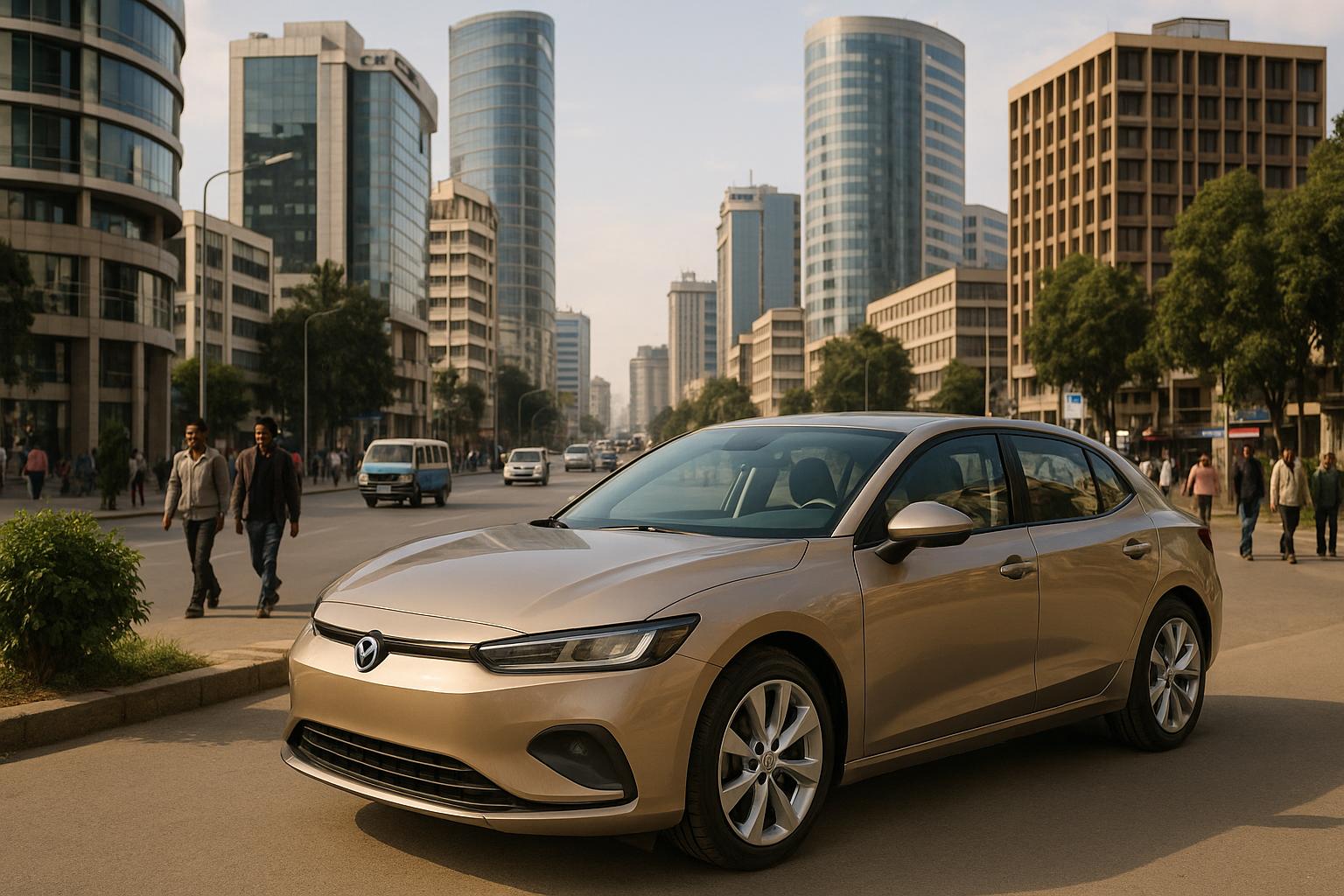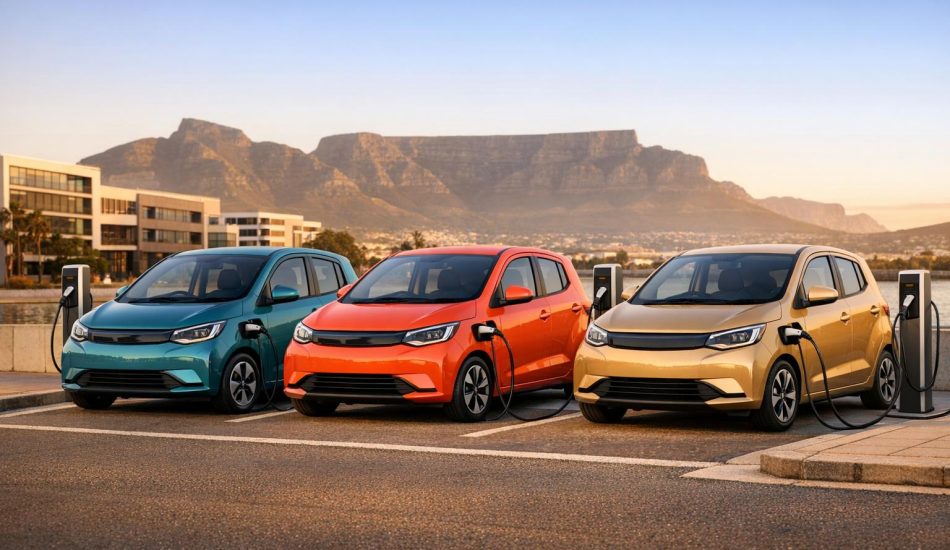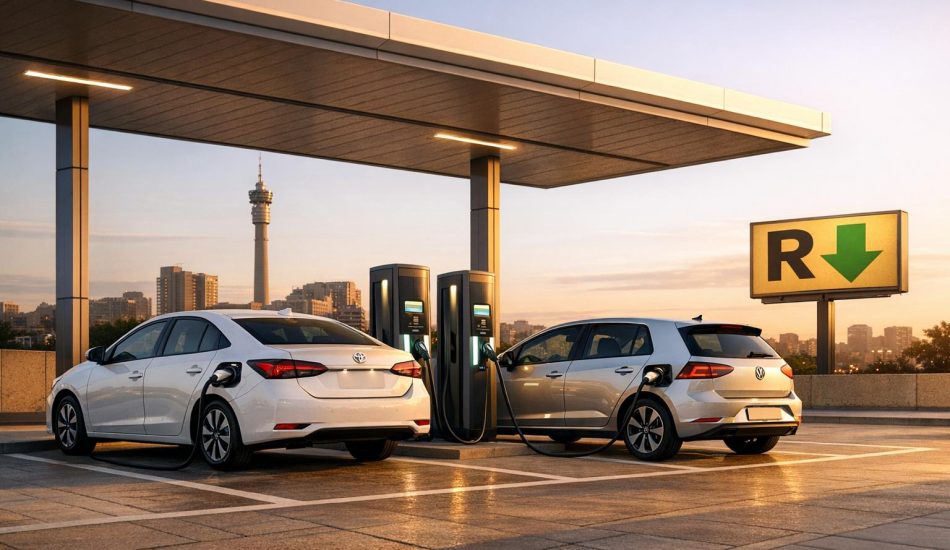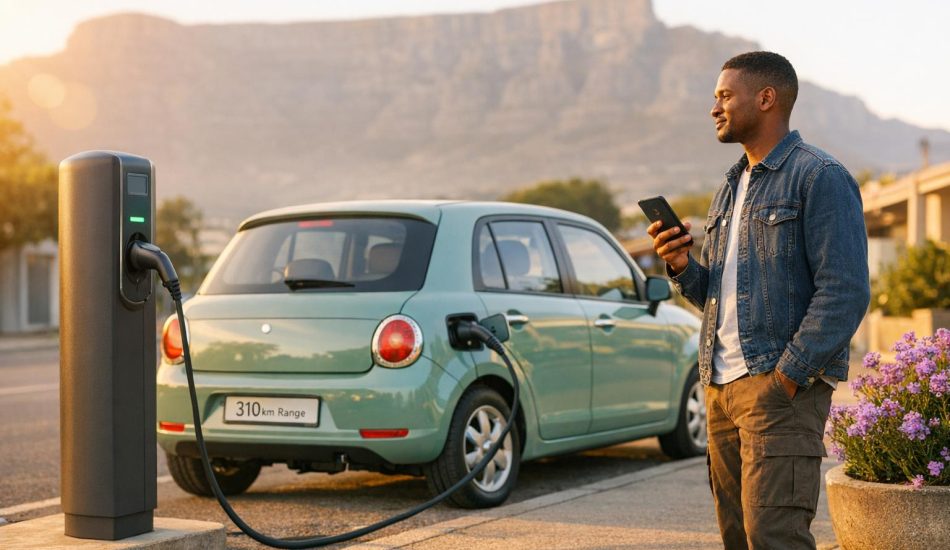
Electric vehicles (EVs) are transforming Ethiopia’s transportation landscape. With over 100,000 EVs already on the roads, making up 8.3% of all vehicles, the shift is driven by government policies like the ICE vehicle import ban, tax exemptions, and infrastructure growth. Key points:
- Price Range: EVs cost $18,000–$100,000, with models like the BYD Seagull starting at $19,000.
- Top Brands: BYD, Toyota, GAC, and Tesla offer options from budget to luxury.
- Charging Infrastructure: Ethiopia has 25 public charging stations, with home charging being the most reliable.
- Government Incentives: Reduced import duties (5–20%) and support for local assembly make EVs more affordable.
- Delivery: Import platforms like EV24.africa streamline buying, with delivery typically taking 20–35 days.
Switching to EVs not only lowers fuel costs but also aligns with Ethiopia’s growing focus on clean energy, supported by its abundant hydropower resources. Whether you’re in Addis Ababa or beyond, EVs are becoming a practical choice for Ethiopian drivers.
በኢትዮጵያ ከ3 ሚሊዮን ብር በታች የሚገኝ መኪና! JAC JS1 ኤሌክትሪክ መኪና The Most Affordable Electric Car in Ethiopia
Electric Car Brands and Models Available in Ethiopia
Ethiopian car buyers now have a growing selection of electric vehicles (EVs) to choose from, ranging from budget-friendly models to high-end options. This expanding market features well-known global brands as well as newer names catering to local preferences.
Major EV Brands in Ethiopia
BYD has teamed up with Ethiopia-based MOENCO as of April 2025, introducing five different car models. Thanks to its competitive pricing, BYD has quickly become a key player in the Ethiopian EV market.
GAC Group entered the scene in May 2025, launching its AION Y and ES9 models through a partnership with Huajian Group. The company has ambitious plans to build charging stations and even start local assembly operations. Wei Haigang, president of GAC International, described Ethiopia as a market with strong potential for EV adoption.
Toyota brought its bZ3X to Ethiopia in June 2025, offering it as part of its premium bZ series. However, the price tag reflects steep import duties, making it significantly more expensive than in its home market of China.
Volkswagen is exploring the possibility of setting up an EV manufacturing facility in Ethiopia to strengthen its foothold in the region.
Leapmotor is one of the newer brands entering the market. While its C10 plug-in hybrid SUV is set to launch in South Africa in September 2025, fully electric versions are expected to reach Ethiopia by 2026.
Tesla remains a luxury option in Ethiopia, though its availability is limited due to high import costs.
Best EV Models for 2025
Several standout models are shaping the Ethiopian EV market in 2025:
- BYD Song Plus: Priced between 6.0 million and 6.5 million birr ($43,800 to $47,400).
- BYD Seagull: A more affordable choice, with prices ranging from 2.6 million to 3.05 million birr ($19,000 to $22,300).
- BYD Tang DM-I: A premium SUV available for 7.3 million to 7.9 million birr ($53,300 to $57,700).
- Toyota bZ3X: Priced between 4.5 million and 5.1 million birr ($32,800 to $37,200), this sedan offers a mid-range option.
- Toyota bZ4X: A premium SUV targeted at higher-end buyers, with prices ranging from 5.7 million to 6.0 million birr ($41,600 to $43,800).
GAC’s AION Y and ES9 models further diversify the lineup, covering everything from compact SUVs to luxury vehicles.
EV Model Comparison Chart
| Model | Price Range (Birr) | Price Range (USD) | Category | Key Features |
|---|---|---|---|---|
| BYD Seagull | 2.6M – 3.05M | $19,000 – $22,300 | Compact | Entry-level; great for city driving |
| Toyota bZ3X | 4.5M – 5.1M | $32,800 – $37,200 | Sedan | Reliable mid-range choice |
| Toyota bZ4X | 5.7M – 6.0M | $41,600 – $43,800 | SUV | Premium electric SUV |
| BYD Song Plus | 6.0M – 6.5M | $43,800 – $47,400 | Family SUV | Spacious, family-friendly |
| BYD Tang DM-I | 7.3M – 7.9M | $53,300 – $57,700 | Premium SUV | High-end features |
High import taxes and additional costs mean that EV prices in Ethiopia are significantly higher than factory prices. For instance, Toyota’s bZ3X, which costs about $15,000 in China, is sold for nearly $48,000 (6.3 million birr) in Ethiopia.
As the Ethiopian government works toward its goal of having 500,000 EVs on the roads by 2030, the market is expected to grow, with more models designed to suit local conditions.
Electric Car Prices in Ethiopia: 2025 Market Analysis
After looking at the variety of EV models available, let’s dive into pricing trends and the factors shaping them. The Ethiopian EV market is seeing shifts in prices as supply grows, particularly with the influx of models from Chinese manufacturers. Knowing these trends and what drives costs can help you make smarter purchasing decisions.
New and Used EV Price Ranges
New electric vehicles in Ethiopia are priced between $18,000 and $100,000, depending on the model and features offered. As the market expands, prices have started to drop.
For instance, the BYD Seagull saw its price fall from 3.2 million birr to 2.7 million birr (around $19,700). Other models, like the Toyota bZ4X and BYD Song Plus, experienced reductions of 500,000 to 1 million birr.
Used EVs, like the BYD Seagull, begin at 2.2 million birr (approximately $16,100). However, resale values are impacted by limited repair infrastructure and the high cost of replacement parts.
"There’s a flood of new models – five BYDs alone last month – but customers are asking harder questions about value and support." – Owner of an EV dealership in Addis Ababa
The rapid growth of Ethiopia’s EV market is clear, with EVs making up over 60% of new vehicle sales in 2024. The national fleet expanded from 4,600 vehicles in early 2023 to about 14,000 by January 2025. These price changes highlight the influence of policies and market dynamics.
What Affects Electric Car Prices
Government tax policies play a major role in EV pricing in Ethiopia. In November 2022, customs duties on electric vehicles were slashed to 15%, compared to the 100–300% charged on fuel-powered cars. For partially assembled EVs, the tax drops even further to 5%, encouraging local assembly efforts.
Still, the markup from factory to showroom remains high due to import costs, taxes, and dealer margins. These factors underline how trade policies continue to shape the country’s EV market.
Market demand is another key factor. For example, the BYD Seagull’s price jumped from 1.7–1.8 million birr last year to 2.6–2.7 million birr today. This increase is tied to rising demand and the devaluation of the birr.
Extra Costs When Buying an EV
The sticker price is just one part of the equation. Additional costs can significantly affect overall ownership. Charging an ID4 from 20% to 80–90% costs only 20 birr (less than $0.05), but setting up a home charging station might require extra electrical work, with costs varying depending on your home’s setup.
Financing options are also evolving. While cash remains common, installment plans are making EVs more accessible. Comparing financing terms can help you secure the best deal.
"When Ethiopians buy cars, they’re thinking about resale. EVs depreciate more quickly because there are so few repair centers, and parts are expensive and slow to import." – Economist
How to Buy an Electric Car in Ethiopia
Getting an electric vehicle (EV) in Ethiopia has become more convenient thanks to platforms that manage the import process. Knowing the steps involved in buying and receiving your EV can help you avoid common issues and make the process smoother.
Buying Process Through EV24.africa

EV24.africa makes it easier to import and purchase electric vehicles in Africa, offering a straightforward and reliable experience. The platform takes care of the logistics, including import and delivery, while following international commercial terms (Incoterms). You can browse a selection of new and used EVs from top brands, complete with detailed specifications and clear pricing. Once you find the right vehicle, you can request a quote and rely on their customer support for guidance.
The platform provides two main purchase options:
- Delivered Duty Paid (DDP): This option takes care of everything, including import duties, taxes, and logistics, ensuring a stress-free experience.
- Free on Board (FOB): If you’d prefer more control over shipping and import costs, this option might suit you better.
These options fit well with Ethiopia’s evolving import landscape, making the process easier for buyers.
Delivery Process and Wait Times
Once you’ve chosen your purchase option, understanding the delivery timeline is essential. Since Ethiopia is landlocked, imported vehicles first arrive at ports in neighboring countries – such as Djibouti, Mombasa (Kenya), or Dar es Salaam (Tanzania). EV24.africa typically uses the Port of Djibouti, with overland delivery handled by All TransportDepot Inc..
Delivery generally takes 20–35 days, covering both ocean shipping and overland transport. However, delays can happen due to factors like port congestion, customs processing, or weather conditions. As only professional companies are allowed to import vehicles into Ethiopia, EV24.africa ensures all necessary import documents are prepared and complies with local regulations.
The final step is registering your EV with local authorities. This process can take time. For instance, registering motorcycles has taken up to six months to get a license plate. However, services like Beatrix can speed up the process for delivery companies, reducing the wait to about two months.
"We supply high-quality, thoroughly inspected new and used EVs from 60+ worldwide brands to Ethiopia." – GuangcaiAuto
Before completing your purchase, it’s wise to carefully research the market and pick a trustworthy logistics partner to ensure your EV arrives safely and on time. With Ethiopia’s ban on non-electric vehicle imports and over 30,000 EVs already in use, the infrastructure for EV buyers is steadily improving.
sbb-itb-99e19e3
EV Charging and Maintenance in Ethiopia
When you purchase an electric vehicle (EV) through EV24.africa, understanding the local options for charging and maintenance is key to keeping your car running smoothly. Ethiopia’s EV charging network is growing, though it’s still in its early stages compared to more developed countries.
Public EV Charging Stations in Ethiopia
As of Q2 2025, Ethiopia has 25 public charging stations in operation, along with 30 to 40 private and fleet hubs scattered across the country. Most of these are concentrated in Addis Ababa, where over 100,000 electric vehicles are currently in use.
Ethio Telecom has stepped up as a major player in building charging infrastructure. In February 2025, they launched their first ultra-fast EV charging hub in Addis Ababa, located at the Bole–Megenagna area. This hub can charge 32 EVs at once, with eight 600kW ultra-fast chargers and twelve 500kW super-fast chargers. Since its launch, the hub has powered 14,280 vehicles, delivering 376,574.72kWh of electricity and reducing CO₂ emissions by an estimated 521,074.23 kg.
Following this success, Ethio Telecom opened a second ultra-fast charging station in April 2025 along the Megenagna to Bole road. This station accommodates up to 16 vehicles at a time and includes specialized chargers for European electric vehicle models.
Private companies like TotalEnergies and Green Tech Africa are also investing in charging facilities across major cities. Meanwhile, the Ethiopian government is pushing for broader infrastructure development. Yizengaw Yitayih, a senior climate change expert at Ethiopia’s Ministry of Transport and Logistics, emphasized:
"The government is committed to expanding deployment of infrastructure throughout the country, including the capital, Addis Ababa, and emerging cities".
For drivers looking to locate nearby chargers, apps like Electromaps list 13 available stations in Ethiopia. However, the network still has reliability issues, as noted by Sam Rosmarin, a climate entrepreneur based in Addis Ababa:
"From a consumer standpoint, is the country ready to support these EVs? No, there’s only a handful of chargers".
For a more dependable solution, installing a home charging station might be your best bet.
Setting Up Home EV Charging
Home charging is the most convenient and reliable option for Ethiopian EV owners. A 7kW charger, for instance, provides three times the power of a standard outlet.
Under Ethiopia’s updated EV charging guidelines, private home chargers are exempt from the permitting process. That said, it’s still important to work with a qualified electrician to assess your home’s electrical capacity and choose the best installation spot.
Here’s a breakdown of potential costs for setting up a home charging station:
| Component | Cost Range (USD) | Cost Range (ETB) |
|---|---|---|
| Level 2 Charger Unit | $400 – $2,000 | 22,000 – 110,000 |
| Installation Labor | $800 – $2,500 | 44,000 – 137,000 |
| Permits (if required) | $50 – $800 | 2,700 – 44,000 |
Level 2 chargers are ideal for home use, as they charge vehicles five to seven times faster than Level 1 chargers, which use standard 120-volt outlets. These chargers require a 240-volt dedicated circuit, making them much more efficient for daily needs.
Charging at home also saves money, especially when you schedule charging during off-peak hours. Electricity costs for home charging range from $0.12 to $0.24 per kWh. However, home charging is mostly feasible for urban residents, as only about 12% of rural Ethiopians have access to the electricity grid.
EV Service and Support Options
Maintaining an EV in Ethiopia requires understanding its specific needs and the growing local support network. The government and private sector are both working to meet the demands of the expanding EV population.
EV24.africa goes beyond selling vehicles by connecting customers with local service providers and assisting with warranty claims or technical issues.
Ethiopia has introduced new safety standards under Electric Vehicles Charging System (EVCS) directive no 1034/2024, which ensures "safe, reliable, accessible, and affordable charging infrastructure". Article 7 of this directive even provides compensation for damages caused by faulty charging systems.
The country’s technical expertise is also improving. Ethiopian universities are now offering programs to train professionals in EV maintenance and cybersecurity. For instance, Addis Ababa University‘s Institute for Technology has launched hands-on EV workshops to build local skills.
In terms of manufacturing, the government is encouraging local production of EVs and batteries. Companies like Belayneh Kindie Metal Engineering Complex are already assembling electric buses using imported components, signaling progress in local manufacturing.
Still, challenges remain. Yasaki Yuma, CEO of Ethiopian e-mobility company Dodai, highlighted:
"Customers and sectors both suffer from lack of infrastructure and regulations for e-mobility while we have to deal with it".
EVs generally require less maintenance than traditional vehicles – no oil changes, fewer moving parts, and less frequent servicing. Focus on battery health, software updates, and tire care. Many EVs also feature remote diagnostics, allowing service providers to identify and address issues early on.
As Ethiopia works toward its ambitious goal of reaching 500,000 EVs within the next decade, charging infrastructure and maintenance services are expected to grow, making EV ownership more practical and accessible.
Making the Switch to Electric Cars in Ethiopia
Ethiopia is embracing electric vehicles (EVs) in a big way, with 100,000 EVs already on the roads – making up 8.3% of all vehicle registrations. This shift is not only about cleaner transportation but also about long-term savings and better health outcomes for the population.
Switching to an EV could save owners about $1,500 each year on maintenance and fuel costs. That’s a big deal in a country that spends billions on fuel imports. But the benefits don’t stop at your wallet. EVs also contribute to reducing air pollution, which is currently Ethiopia’s second largest cause of disability and mortality. In fact, poor air quality is expected to account for 32% of all deaths in Addis Ababa by 2025. Yizengaw Yitayih, a Senior Climate Change Expert at Ethiopia’s Ministry of Transport and Logistics, highlights the broader impact:
"The use of electric vehicles contributes significantly to the reduction of greenhouse gas emissions, the foreign currency used for fuel, and the emission of harmful gases to the respiratory system."
– Yizengaw Yitayih
The Ethiopian government is also making it easier than ever to go electric. It was the first country to ban imports of gasoline and diesel vehicles , and it offers major tax breaks for EV buyers. Fully assembled EVs are subject to a 20% customs duty, while semi-assembled EVs are taxed at just 5%. Locally assembled EVs, made from completely knocked-down kits, are entirely exempt from customs duties.
For those looking to make the switch, EV24.africa simplifies the process. They connect buyers with top EV brands, provide clear pricing and financing options, and offer ongoing support. From choosing the right model to handling delivery, they make EV ownership straightforward. Plus, they assist with warranties and technical issues, ensuring a smooth ownership experience.
Although Ethiopia’s charging network is still growing, the government is working to install charging stations every 50 to 120 kilometers. For now, home charging is the most reliable option, and with electricity costs at just $0.03 per kWh, powering an EV is far cheaper than filling up a gas tank.
Looking ahead, Ethiopia aims to have 500,000 EVs on the roads within the next decade. This ambitious goal means more infrastructure and support will be coming soon. Early adopters not only enjoy financial savings and tax incentives but also play a role in advancing sustainable transportation while enjoying the smooth, quiet performance of electric vehicles.
FAQs
What should I consider when installing a home charging station for an electric vehicle in Ethiopia?
Setting up a home charging station in Ethiopia presents some distinct hurdles. One of the biggest concerns is the high installation cost, which typically falls between $800 and $2,000. On top of that, the country’s unreliable power grid, especially in rural areas, adds another layer of complexity. Many homes might also need electrical upgrades to handle the added power demand from a charging station.
To navigate these challenges, careful planning is key. Ensuring your home’s electrical system can handle the station and preparing for possible outages are critical steps. Working with a professional installer who understands the local infrastructure can make the process much easier and more dependable.
How does Ethiopia’s tax policy affect the cost of buying and owning an electric car?
Ethiopia’s tax policies are a key factor in lowering the cost of electric vehicles (EVs) for consumers. Fully assembled EVs face a 15% tax, while semi-assembled ones are taxed at just 5%. For locally assembled EVs, the imported CKD kits are completely tax-free, which helps cut down production expenses significantly.
These tax breaks have resulted in a 40–50% decrease in EV prices, making them much more affordable for buyers. On top of that, the government offers additional incentives to promote local EV manufacturing, aiming to accelerate the transition to electric mobility throughout the country.
What challenges does Ethiopia’s public charging infrastructure present for everyday use of electric vehicles?
Ethiopia’s Public Charging Network: Current Landscape
As of 2025, Ethiopia’s public charging infrastructure is still in its infancy, with roughly 50 charging stations spread across the country. Unsurprisingly, most of these stations are clustered in urban areas, leaving rural regions with scarce access to charging facilities. This creates challenges for EV drivers, especially when it comes to long-distance travel or operating in less-developed areas.
Another hurdle is the distance between charging stations, which are often more than 74 miles (120 kilometers) apart. For many drivers, this spacing may not be ideal. To compound the issue, the reliability of Ethiopia’s electrical grid can sometimes be unpredictable, leading to potential delays or interruptions in charging. These factors make it essential for EV users in Ethiopia to plan their routes carefully, particularly when venturing beyond the major cities.




